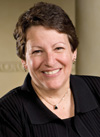 Wisconsin
Lawyer
Wisconsin
Lawyer
Vol. 81, No. 12, December
2008
President's Message
Speaking for the
Justice System
As a lawyer, President-elect Barack
Obama may be receptive to the issues of the law and the legal
profession, and a fair and impartial justice system for all.
 by Diane S.
Diel
by Diane S.
Diel
This year a major topic is elections. Wisconsin’s supreme court
elections have concerned many of us, and the ABA is now studying
judicial election reform. We are dealing with a challenge to
Wisconsin’s Judicial Conduct Code on the ground that the code
violates the First Amendment because judicial candidates cannot identify
themselves as a member of a political party. We also are dealing with
State Bar elections for president-elect, which can be won without a
majority vote. Until now, the election we haven’t talked about is
the election for U.S. president.
Perhaps you didn’t support the candidacy of the
president-elect. Even if you didn’t support Barack Obama, there is
good news about his election we can all share: Once again, a lawyer will
be president of the United States.
Our lawyer president-elect has a full plate of problems to
address. The economy, the war, climate change, energy independence, and
enormous budget deficits are obviously pressing and require immediate
attention and swift action. Even with such devastating problems to
address, this newly elected president may be receptive to the issues of
the law and the legal profession. It is even possible that, like John F.
Kennedy in 1960, he will agree to meet with the presidents of the state
bar associations to address those issues.
In August 2008, I was invited to a meeting of bar presidents from
across the country to discuss whether we could set an agenda with the
presidential candidates. The meeting was convened in the office of New
York State Bar President Bernice Leber during the National Conference of
Bar Presidents meeting. There, we discussed a strategy to bring the
issues facing the administration of the justice system to the
candidates.
Ultimately, a letter addressing those issues was sent to each
candidate requesting meetings – both before the election and after
the inauguration – between the bar presidents and the candidate to
address the issues. Although no meeting materialized during the
campaign, there is hope for a post-inaugural meeting.
The first issue the bar presidents raised to the candidates was
the right to counsel for civil legal services including, specifically,
the candidates’ support for funding of civil legal services
programs that provide counsel for child custody litigation and housing
programs. The ultimate question asked was whether the candidate would
support a federal civil-Gideon right to representation in civil
legal disputes.
The second set of questions was designed to measure the
candidates’ willingness to support programs ensuring an impartial,
independent, and adequately compensated judiciary. The bar presidents
also asked about the candidates’ support for mandatory recusal in
any case in which a lawyer representing a client before the court made a
contribution to the judge.
Finally, the presidents asked how the candidate would support the
need for civics education, relying on retired U.S. Supreme Court Justice
Sandra Day O’Connor’s remark, “Knowledge of our
Constitution and the role of the courts is not handed down in the gene
pool. Each generation must learn about our system of government and the
citizen’s role.” The bar presidents asked whether the
candidates view the lack of civics education to be a national problem
and, if so, how that problem might be solved.
All three of these topics address issues that lie at the heart of
the State Bar of Wisconsin’s strategic plan. The enormous need of
low-income individuals for lawyers in civil legal matters is well known
in this state. Concern, if not disgust, over our judicial election
process is everywhere. The Bar is working to expand programming to
increase the public’s understanding of the law and the legal
system.
President-elect Obama has not yet replied to the bar
presidents’ request for a meeting. There are so many pressing
issues on his plate that it would be understandable if he deferred or
demurred. However, there is still a chance of a meeting and more
importantly, there is a chance the president-elect would be favorable to
the positions of the organized bar associations.
I can’t wait to meet the new president. We have so much to
discuss.
Wisconsin Lawyer
